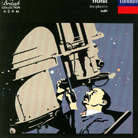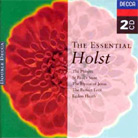 |
| March 15, 2004  Gustav
Holst’s The Perfect Fool under Sir Adrian Boult Gustav
Holst’s The Perfect Fool under Sir Adrian Boult
Those who are serious about music and go after recordings that do the music and its performance full sonic justice are likely to have a bunch of favorite recordings that they use as "references." These releases may not represent the greatest or most important works in the repertory, but they qualify as the demonstrably best recordings in their respective genres. They are so regarded for their high-level combination of musical substance, persuasive performance, and sound quality that is not only first-rate by any measurable standard but also particularly well-tailored to the material at hand. Such recordings are not as plentiful as we might like, and that means that those examples we do find are all the more treasured -- for evaluating or showing off new equipment and, more to the point, for the deep, self-renewing pleasure they afford. By anyone’s definition, such recordings are "keepers." The CD I reach for first when I have a new CD player or cables to try out is Sir Adrian Boult and the London Philharmonic’s incomparable stereo recording of the Ballet Music from Gustav Holst’s one-act opera, The Perfect Fool [Decca 425 152-2]. The 11-minute piece itself is an amazing little "concerto for orchestra" in which every instrument and instrumental choir gets its moment in the spotlight. In both its brilliant scoring and its good tunes, it is more than a match for the best moments in Holst’s far-better-known 50-minute suite, The Planets, and Boult had its measure as no other conductor I’ve heard.
Although this recording dates from March 1961, it remains, by any meaningful criteria, a viable candidate for "best orchestral recording." The engineer was not the late Kenneth Wilkinson but the lesser-known Alan Reeve; many a reputation has rested on less than what Reeve achieved here -- particularly in the first of the Ballet Music’s three dances, Dances of the Spirits of Earth, so rich in brilliant effects (track 8). You can almost see the bows making contact with the strings when the double basses play their big tune against low-woodwind punctuation at 1:06. The spaciousness of the recording is remarkably effective at the low end in the swelling figure at 2:05, and the sleigh bells against trumpets and horns about 2:30.
Quite a few of my "all-time best" or "desert island" orchestral CDs come from Decca/London and will be duly acknowledged in this series. Next, time, though, the "best" string quartet recording, from Deutsche Grammophon. ...Richard Freed
Ultra Audio is part of the SoundStage! Network. |
 Boult and the LPO recorded this
irresistible piece monophonically in the mid-1950s with some other seldom-heard but
stunning British works in which his authority was similarly evident and effective. While
the account of Sir Arnold Bax’s Tintagel on that LP has never been surpassed,
by Boult himself or by anyone else, the stereo remake of The Perfect Fool not only
matches the persuasiveness of the earlier performance, but gains appreciably in the
stereophonic placement of the opening trombone fanfare and various other episodes.
Boult and the LPO recorded this
irresistible piece monophonically in the mid-1950s with some other seldom-heard but
stunning British works in which his authority was similarly evident and effective. While
the account of Sir Arnold Bax’s Tintagel on that LP has never been surpassed,
by Boult himself or by anyone else, the stereo remake of The Perfect Fool not only
matches the persuasiveness of the earlier performance, but gains appreciably in the
stereophonic placement of the opening trombone fanfare and various other episodes. The companion works on
Boult’s all-Holst LP were the still less familiar tone poem Egdon Heath (after
Thomas Hardy) and The Hymn of Jesus, a brilliantly scored work for chorus
and orchestra. On CD, Decca omitted the Hymn and gave us instead Georg
Solti’s 1978 performance of The Planets, also with the LPO (in this case, a
Wilkinson-engineered recording). The original CD whose number is given above had an
all-too-brief catalog life as part of Decca’s British Collection series. The
same material turned up again on the first of the two discs in a Double Decca set, The
Essential Holst [Decca 444 549-2]. So far, this set has not been issued in the US but
is readily available by mail order from British retailers, and can be found in the Imports
sections of several resourceful shops here. The second disc brings back The Hymn of
Jesus (Boult with the BBC Chorus and SO), several brief choral pieces conducted by the
composer’s daughter, Imogen Holst, and the Grimethorpe Colliery Band under Elgar
Howarth in A Moorside Suite. There’s also a crisp account of the
ingratiating St. Paul’s Suite for string orchestra, by Christopher Hogwood and
the unrelated but obviously committed St. Paul Chamber Orchestra. The Perfect Fool alone
is well worth this set’s price -- not that much more than the original single CD of
the three orchestral items alone.
The companion works on
Boult’s all-Holst LP were the still less familiar tone poem Egdon Heath (after
Thomas Hardy) and The Hymn of Jesus, a brilliantly scored work for chorus
and orchestra. On CD, Decca omitted the Hymn and gave us instead Georg
Solti’s 1978 performance of The Planets, also with the LPO (in this case, a
Wilkinson-engineered recording). The original CD whose number is given above had an
all-too-brief catalog life as part of Decca’s British Collection series. The
same material turned up again on the first of the two discs in a Double Decca set, The
Essential Holst [Decca 444 549-2]. So far, this set has not been issued in the US but
is readily available by mail order from British retailers, and can be found in the Imports
sections of several resourceful shops here. The second disc brings back The Hymn of
Jesus (Boult with the BBC Chorus and SO), several brief choral pieces conducted by the
composer’s daughter, Imogen Holst, and the Grimethorpe Colliery Band under Elgar
Howarth in A Moorside Suite. There’s also a crisp account of the
ingratiating St. Paul’s Suite for string orchestra, by Christopher Hogwood and
the unrelated but obviously committed St. Paul Chamber Orchestra. The Perfect Fool alone
is well worth this set’s price -- not that much more than the original single CD of
the three orchestral items alone.